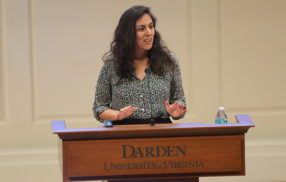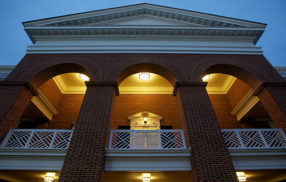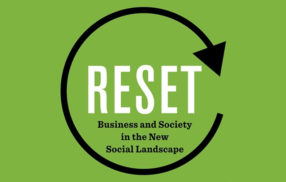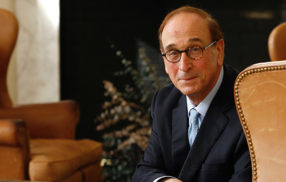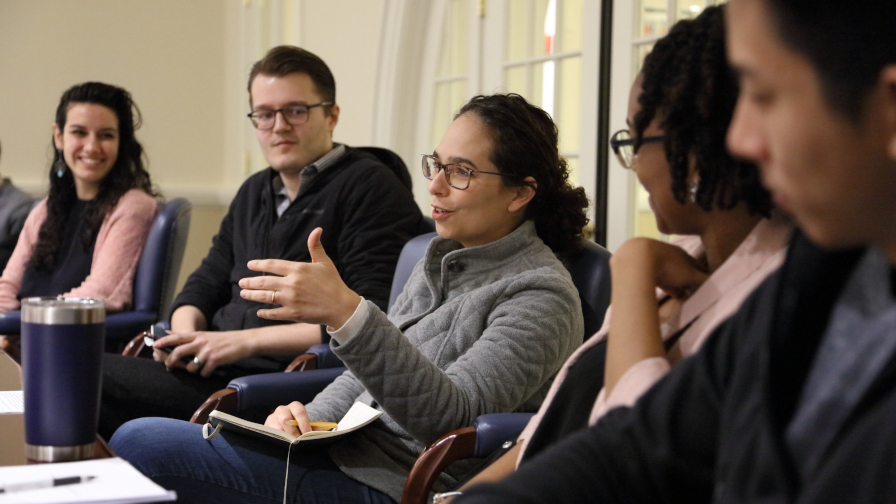
Morela Hernandez: A Driving Force for Behavioral Research to Benefit Society
By Carlos Santos
How do leaders formulate a system in which the long-term viability of not only the organization but the society in which they exist is an important factor in their decision-making? How do you train someone to make the type of decisions that are not just self-based but other-oriented?
These are examples of the burning questions that drive the work of University of Virginia Darden School of Business Professor Morela Hernandez — an associate professor in the Leadership and Organizational Behavior area at Darden and academic director of the Behavioral Research at Darden (BRAD) Lab. By probing those questions, Hernandez is determining how organizations develop governance systems.
“To me, that’s a passion. And it’s not good enough to just study it,” she said.
Her passion has led Hernandez to expand the impact of behavioral research at Darden and the University of Virginia to business practitioners through a project called the Behavioral Research for Society (BRS) lab.
“I wanted the ability to take the research that I do and have a greater impact on individuals outside the academic environment,” said Hernandez, who was born in Honduras and speaks four languages. “I thought Darden would offer an opportunity to directly communicate in a much broader way with the individuals who could put this into practice. And I can say it’s happened in a very positive way.”
Hernandez worked with Dean Scott Beardsley to secure $2.2 million in startup funding support from UVA’s Strategic Investment Fund, to build a collaborative research infrastructure for the BRS lab “that will facilitate the generation of new knowledge and solve pressing problems in business and society.”
With the startup funding, Hernandez said ongoing work can be extended in three broad areas:
- Diversity and the correction of racial and gender biases in society
- Sustainability and the creation of more sustainable decision-making practices across generations
- Health, using practices related to mindfulness and compassion to improve health outcomes
And she strongly believes it’s important to make the BRS lab self-sustaining. “I think any responsible leader creates a system that can operate without them.”
Hernandez and Beardsley see the project as one that would “further position UVA to lead in the application of behavioral science to solve society’s biggest problems across disciplines.” For example, through a developing partnership with the UVA School of Engineering, the project would be like Harvard University’s Wyss Institute, which has received over $250 million to apply biological science to world issues.
“If you care about big problems, I think it’s impossible to solve them in one discipline,” said Hernandez. “And if you’re curious about how others view different pieces of the problem, together you can be much more effective.”
Over the past few years, she has fostered relationships with colleagues across UVA, including the schools of nursing, medicine, public policy, education and engineering as well as with private partners “to understand how our scholarship can have a larger, more substantive cumulative impact. That’s the driving force behind the idea of interdisciplinary collaboration. I wake up every morning thinking: How do we strengthen and increase our research culture at Darden, and how can others on Grounds contribute to those efforts? How can we help each other?”
Darden’s BRAD Lab — an interdisciplinary laboratory supporting behavioral research — is the center from which Hernandez hopes to grow the more comprehensive BRS lab. The BRS lab will offer space, equipment, social infrastructure — including a human subject pool, staff and research assistants — “to stimulate cross-functional collaboration and to streamline faculty time in designing and executing a wide range of studies.”
As Hernandez puts it, the BRS lab will serve as a “nexus of research development for scholars across schools at UVA who want to use behavioral science to take on social issues.” The BRAD Lab already provides support to at least 100 researchers, including 45 affiliated faculty at eight schools at UVA.
Hernandez came to Darden more than three years ago from the University of Washington, and she has more than a decade of experience teaching leadership development. Her move to Darden was motivated by her desire to further improve her teaching within a supportive, expert community of world-class instructors. Her desire to be at UVA was grounded in what she describes as unique opportunities for interdisciplinary scholarship.
Darden’s teaching culture struck her at once.
“Stepping into the classroom and watching what my colleagues do is inspiring. They create an environment where students come with open minds and open hearts, creating one conversation among 60 classmates that drives home points better than any PowerPoint slides could. I was humbled by their sheer expertise and how much I could learn from them. I’ve become a much better teacher over the past three years, and it is because of the support and coaching of my colleagues here at Darden. That was the primary motivation for moving, and my expectations were not only met but exceeded.”
Hernandez’s philosophy, meanwhile, is to keep learning. “I’m highly competitive. Not necessarily against others. I want to improve because I want to get better. I know I can get better because my greatest aspiration is to help inspire collaborations that will benefit us over the long term.”
The University of Virginia Darden School of Business prepares responsible global leaders through unparalleled transformational learning experiences. Darden’s graduate degree programs (MBA, MSBA and Ph.D.) and Executive Education & Lifelong Learning programs offered by the Darden School Foundation set the stage for a lifetime of career advancement and impact. Darden’s top-ranked faculty, renowned for teaching excellence, inspires and shapes modern business leadership worldwide through research, thought leadership and business publishing. Darden has Grounds in Charlottesville, Virginia, and the Washington, D.C., area and a global community that includes 18,000 alumni in 90 countries. Darden was established in 1955 at the University of Virginia, a top public university founded by Thomas Jefferson in 1819 in Charlottesville, Virginia.
Press Contact
Molly Mitchell
Senior Associate Director, Editorial and Media Relations
Darden School of Business
University of Virginia
MitchellM@darden.virginia.edu





